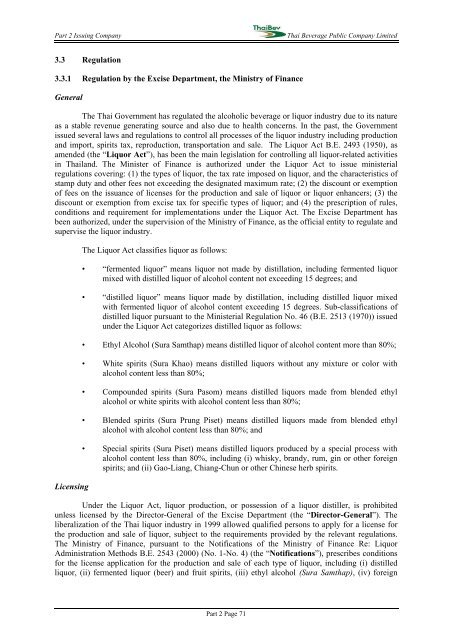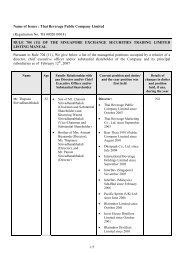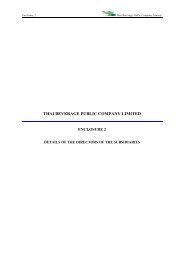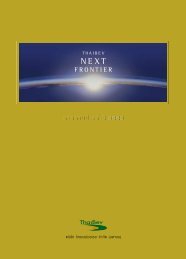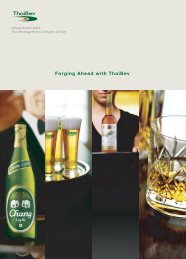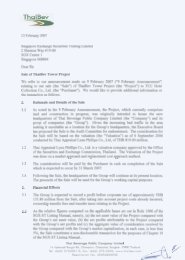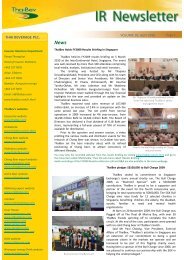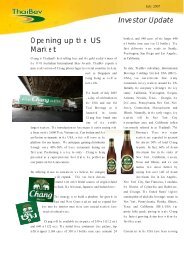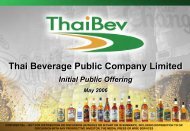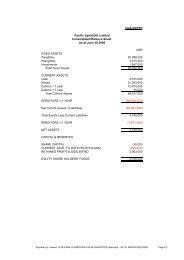PROSPECTUS THAI BEVERAGE PUBLIC COMPANY LIMITED ...
PROSPECTUS THAI BEVERAGE PUBLIC COMPANY LIMITED ...
PROSPECTUS THAI BEVERAGE PUBLIC COMPANY LIMITED ...
You also want an ePaper? Increase the reach of your titles
YUMPU automatically turns print PDFs into web optimized ePapers that Google loves.
Part 2 Issuing CompanyThai Beverage Public Company Limited3.3 Regulation3.3.1 Regulation by the Excise Department, the Ministry of FinanceGeneralThe Thai Government has regulated the alcoholic beverage or liquor industry due to its natureas a stable revenue generating source and also due to health concerns. In the past, the Governmentissued several laws and regulations to control all processes of the liquor industry including productionand import, spirits tax, reproduction, transportation and sale. The Liquor Act B.E. 2493 (1950), asamended (the “Liquor Act”), has been the main legislation for controlling all liquor-related activitiesin Thailand. The Minister of Finance is authorized under the Liquor Act to issue ministerialregulations covering: (1) the types of liquor, the tax rate imposed on liquor, and the characteristics ofstamp duty and other fees not exceeding the designated maximum rate; (2) the discount or exemptionof fees on the issuance of licenses for the production and sale of liquor or liquor enhancers; (3) thediscount or exemption from excise tax for specific types of liquor; and (4) the prescription of rules,conditions and requirement for implementations under the Liquor Act. The Excise Department hasbeen authorized, under the supervision of the Ministry of Finance, as the official entity to regulate andsupervise the liquor industry.LicensingThe Liquor Act classifies liquor as follows:• “fermented liquor” means liquor not made by distillation, including fermented liquormixed with distilled liquor of alcohol content not exceeding 15 degrees; and• “distilled liquor” means liquor made by distillation, including distilled liquor mixedwith fermented liquor of alcohol content exceeding 15 degrees. Sub-classifications ofdistilled liquor pursuant to the Ministerial Regulation No. 46 (B.E. 2513 (1970)) issuedunder the Liquor Act categorizes distilled liquor as follows:• Ethyl Alcohol (Sura Samthap) means distilled liquor of alcohol content more than 80%;• White spirits (Sura Khao) means distilled liquors without any mixture or color withalcohol content less than 80%;• Compounded spirits (Sura Pasom) means distilled liquors made from blended ethylalcohol or white spirits with alcohol content less than 80%;• Blended spirits (Sura Prung Piset) means distilled liquors made from blended ethylalcohol with alcohol content less than 80%; and• Special spirits (Sura Piset) means distilled liquors produced by a special process withalcohol content less than 80%, including (i) whisky, brandy, rum, gin or other foreignspirits; and (ii) Gao-Liang, Chiang-Chun or other Chinese herb spirits.Under the Liquor Act, liquor production, or possession of a liquor distiller, is prohibitedunless licensed by the Director-General of the Excise Department (the “Director-General”). Theliberalization of the Thai liquor industry in 1999 allowed qualified persons to apply for a license forthe production and sale of liquor, subject to the requirements provided by the relevant regulations.The Ministry of Finance, pursuant to the Notifications of the Ministry of Finance Re: LiquorAdministration Methods B.E. 2543 (2000) (No. 1-No. 4) (the “Notifications”), prescribes conditionsfor the license application for the production and sale of each type of liquor, including (i) distilledliquor, (ii) fermented liquor (beer) and fruit spirits, (iii) ethyl alcohol (Sura Samthap), (iv) foreignPart 2 Page 71


